
Бесплатный фрагмент - English Time — 3
Учебно-методическое пособие
Введение
Данное пособие содержит материал по английскому языку для групповых или индивидуальных занятий с учащимися средних общеобразовательных школ, заинтересованных в изучении английского языка дополнительно во внеурочное время.
Пособие направлено на повторение основного курса английского языка (в пособии «English Time-3» собран материал из пособий «English Time-1» и «English Time-2»).
Программа рассчитана на 105 занятий (в неделю 3 занятия по 45 минут).
План занятий по УМП «English Time-3» включает следующие этапы работы:
1. Повторение грамматического материала.
2. Закрепление грамматического материала при выполнении письменных упражнений.
3. Повторение лексического материала.
4. Работа с текстом разной сложности, выполнение заданий к тексту.
5. Совершенствование навыков устной речи (монологической и диалогической).
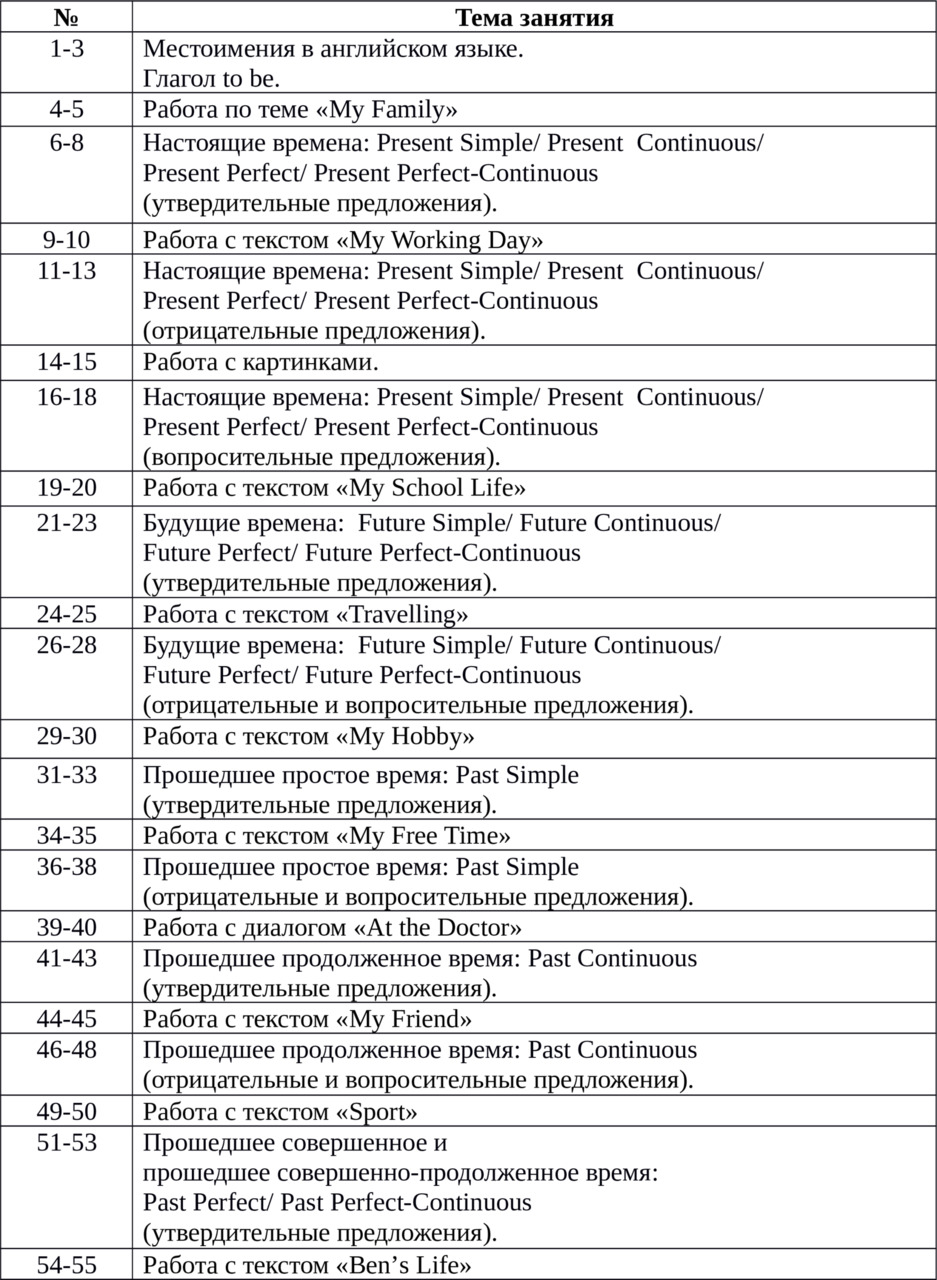
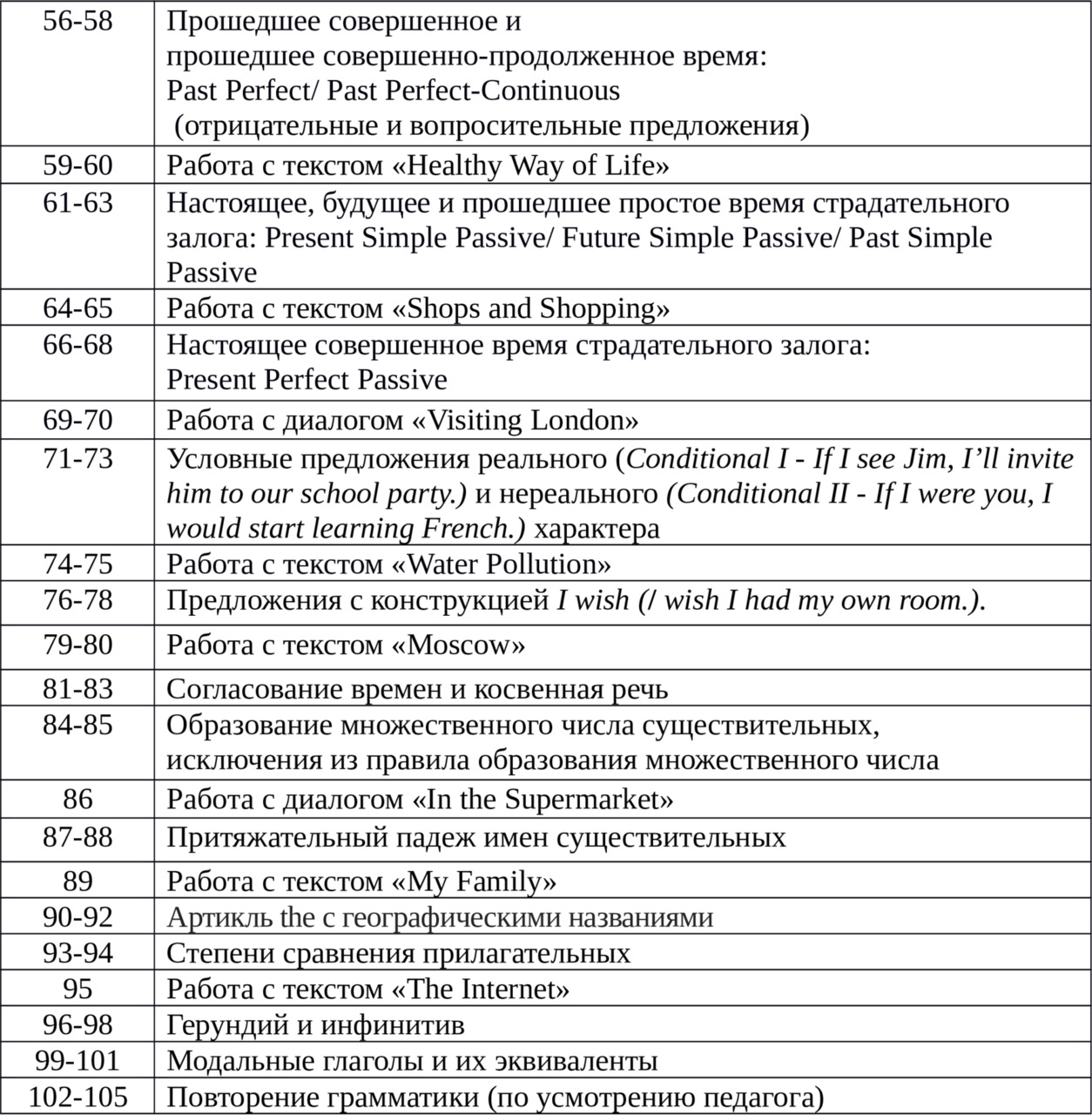
Занятия №№1—3. Местоимения в английском языке. Глагол to be.
Местоимения в английском языке.
Личные местоимения.
I [ai] — я
He [hi: ] — он
She [ʃi: ] — она
It [it] — он/она/оно (одно животное/ один предмет)
We [wi: ] — мы
You [ju: ] — ты, вы
They [ðei] — они
Словом it обозначаются неодушевленные предметы. Стол, компьютер, озеро, книга и мост — все это it. Животных тоже принято обозначать местоимением it.
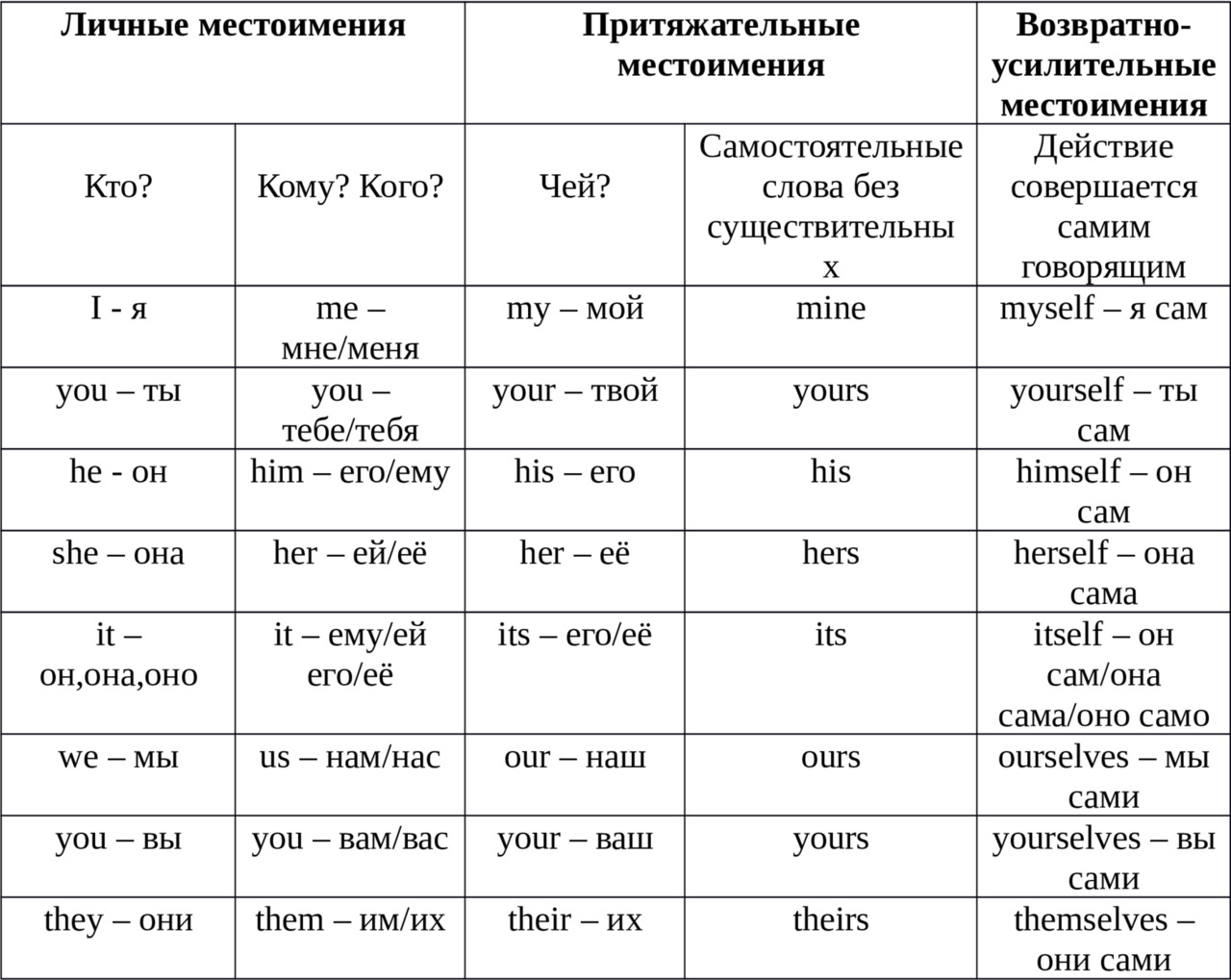
Указательные местоимения
Указательные местоимения служат для указания на предметы, людей, а также для описания времени:
this — этот, эта, это
that — тот, та, то
these — эти
those — те
Вопросительные местоимения
Who? — Кто?
What? — Что?
Where? — Где? Куда?
When? — Когда?
Why? — Почему?
How? — Как?
Which? — Который?
Whose? — Чей?
Отрицательные местоимения
no — никакой
nothing — ничего, ничто
nobody — никто
no one — никто
none — ни один из
neither — ни тот ни другой, ни один, никто
УПРАЖНЕНИЯ
Упр. 1. Вставьте подходящие по смыслу личные местоимения.
1. Betsy is a little girl. … is four.
2. Sarah is young. … is very beautiful.
3. Nick is 12. … is a schoolboy.
4. The vase is on the table. … is new.
5. Are you an student? — Yes, … am.
6. Are the pencils green? — No, … are not.
7. The puppy is in the garden. … is funny.
8. My sister and I are twins. … are 12.
Упр. 2. Замените выделенные слова личными местоимениями в объектном падеже.
1. I love my mother.
2. We like apples.
3. He likes ice-cream.
4. Are you interested in hockey?
5. We must speak to Ben.
6. Give the ball to me and Jane, please.
7. I want to speak to you and your brother.
8. I see my friends every day.
Упр. 3. Замените выделенные слова притяжательными местоимениями.
1. This is Helen’s room.
2. Here is my parents’ car.
3. This student’s sister is my friend.
4. Here is my brother’s flat.
5. Ben, is this your sisters’ book?
6. Ann’s brothers study at the university.
7. Where is the children’s room?
8. Ben’s mother is an engineer.
Упр. 4. Выберите подходящее притяжательное местоимение.
1. Martha is (their, theirs) sister.
2. This is our cat. It is (our, ours).
3. These are Mary’s books. They are (her, hers).
4. Red is (my, mine) favourite colour.
5. You can’t have this book. It is not (your, yours).
6. (Her, Hers) flat is big.
7. Is this (your, yours) coat? — No, it is not (my, mine).
8. Is this your brother’s scooter? — Yes, it is (his, hers).
Глагол to be в настоящем, прошедшем и будущем временах.
Глагол to be в настоящем времени в предложении не переводится, иногда можно перевести как «есть». Этот глагол имеет 3 формы :
I am
He / She / It is
We / You / They are
Например:
I am a student — Я (есть) студент.
He is a singer. — Он (есть) певец.
We are pupils. — Мы (есть) ученики.
В прошедшем времени глагол to be имеет 2 формы:
I / He / she was был (а)
We / You / They were были
Для будущего времени используется сам глагол:
I / He / She / It / We / You / They will be буду, будет, будем, будут
Спряжение глагола to be.
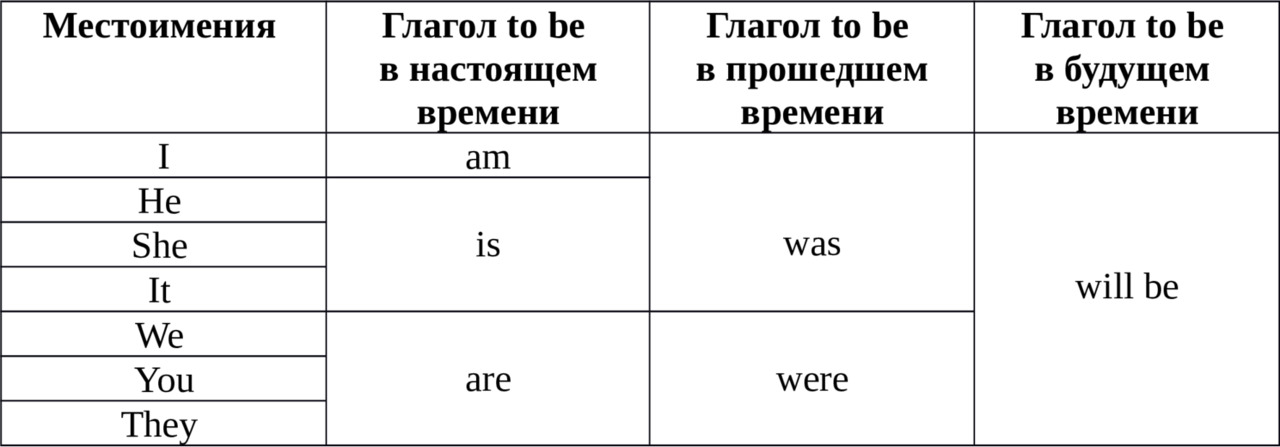
УПРАЖНЕНИЯ
Вставьте необходимую форму глагола to be.
Упр 1.
1. We …… students.
2. My father …. an engineer.
3. My mother… a doctor.
4. The elephant …. grey.
5. They… drivers.
6. Where …. you from? I …. from Russia.
7. … they from Great Britain? Yes, they ….
8. … she a pilot? Yes, she ….
9. How …. you? I …. fine.
10. The big balls …. on the table.
Упр 2.
1. These dogs… funny.
2. Where… you from? I… from Great Britain.
3. How… your brother? He… fine.
4. … they from Russia? No, they… not.
5. Those horses… brown.
6. How… your sister? She… fine.
7. How… your mother? She… fine.
8. … her aunt a teacher? Yes, she ….
9. My sister… an engineer.
10. We… doctors.
Упр. 3. Вставьте глагол to be в Present, Past или Future Simple.
1. My father… a teacher.
2. He… a pupil twenty years ago.
3. I… a doctor when I grow up.
4. My sister… not… at home tomorrow.
5. She… at school tomorrow.
6. My sister… ill last week.
7. She… not ill now.
8. Yesterday we… at the theatre.
9. When I come home tomorrow, all my family… at home.
10. When my granny… young, she… an actress.
11. My friend… in Moscow now.
12. He… in St. Petersburg tomorrow.
ДОМАШНЕЕ ЗАДАНИЕ
Задание на грамматику 1
Преобразуйте слова так, чтобы они грамматически соответствовали содержанию предложений.
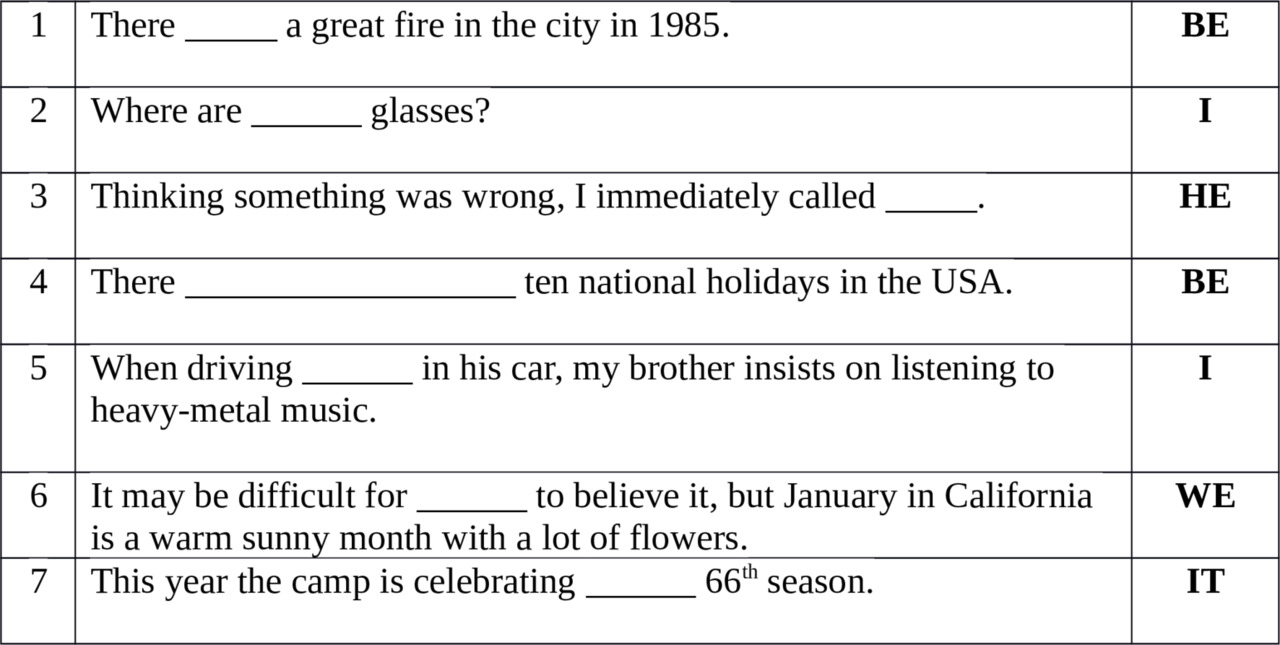
Задание на грамматику 2
Преобразуйте слова так, чтобы они грамматически соответствовали содержанию предложений.
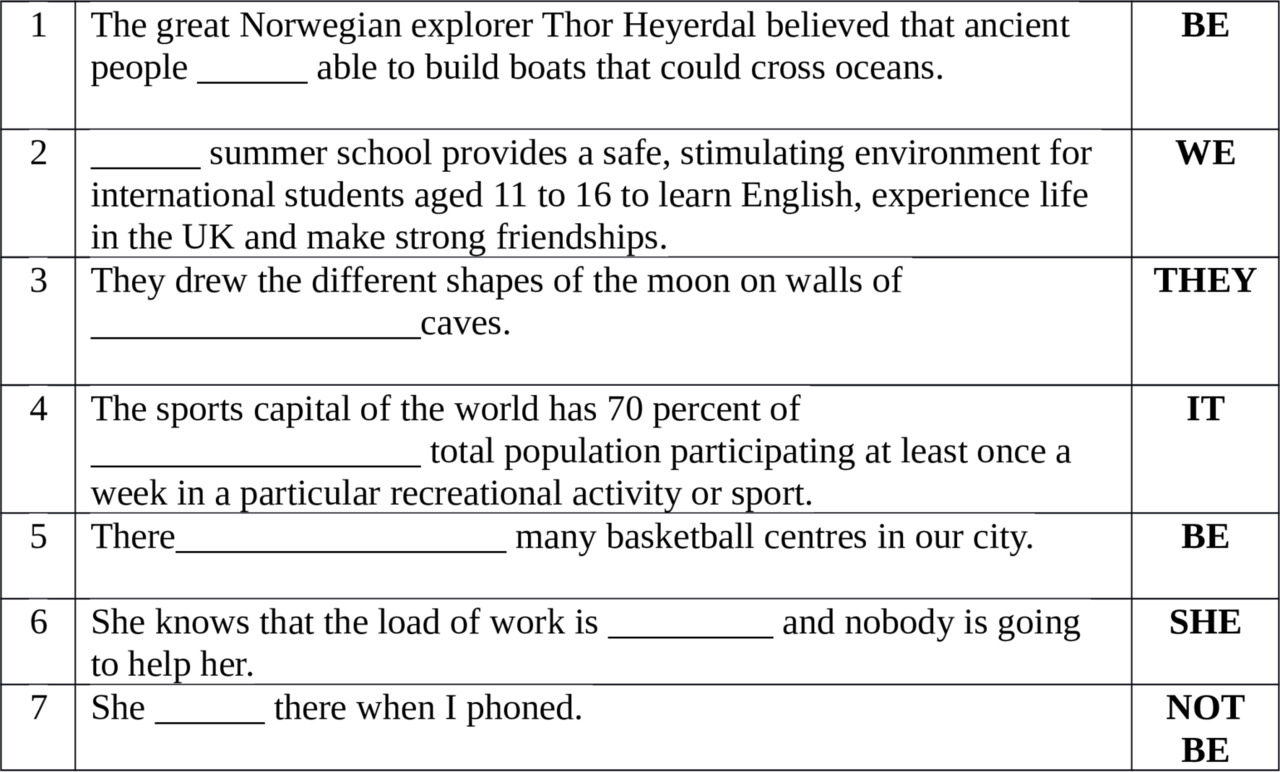
Занятия №№4—5. Работа с текстом «My Family»
ЛЕКСИКА:
neither… nor — ни… ни
together — вместе
the industrial district — промышленный район
talkative — общительный
united — сплоченный, дружный
to agree — соглашаться
opinion — мнение
in the country — в деревне
health — здоровье
relative — родственник
general information — общая информация
1. Прочитайте текст и вставьте вместо каждого пропуска нужную грамматическую форму, выбрав её из четырёх предложенных вариантов.
A) Our family is neither large nor small. I have a mother, a father and a sister. We all live together in a three-room flat. (A) ______ are friendly.
B) My father Almas Idrisovich is 50 years old. He is a tall and well-built man with short black hair and grey eyes. He works as an engineer. He likes his work and spends most of (B) ______ time there.
C) My mother’s name is Gulnara Failevna. She is a teacher of Mathematics. My mother always has a lot of work to do about the house and at school. She (C) _______ a busy woman and we all help her.
D) Our family is very united. We like to spend time together. In the evenings we watch TV, read books and newspapers, listen to music or just talk about the events of the day.
E) All of (D) ________like to spend our weekends in the country. We often go to the village where our grandparents live. They (E) ______ aged pensioners now, but prefer to live in the country. We are happy when we are together.
A 1) our 2) we 3) us 4) ours
B 1) his 2) he 3) him 4) her
C 1) am 2) is 3) are 4) will be
D 1) ours 2) we 3) us 4) our
E 1) was 2) is 3) will be 4) are
2. Установите соответствие между текстами A — E и их темами, выбрав тему 1 — 6 из списка. Используйте каждую тему только один раз. В задании одна тема лишняя.
This text deals with…
1) our hobbies
2) general information
3) about myself
4) my father
5) our weekends
6) my mother
ДОМАШНЕЕ ЗАДАНИЕ
ОБРАЗЕЦ УСТНОЙ РЕЧИ УЧАЩИХСЯ (МОНОЛОГА)
MY FAMILY
1. Hello! My name is ……..
2. I want to tell you about my family.
3. My family is large. I’ve got a mother, a father, a sister, a brother, a grandmother….
4. My mother’s name is __________.
5. She is _____ (forty, thirty-five, thirty)
6. She is a doctor (a bookkeeper, a nurse, a secretary, a teacher, etc.)
7. My father’s name is _______.
8. He is ____ (forty, forty-two, etc.)
9. He is a worker (a baker, a grocer, a driver, a director)
10. I have (haven’t) got a sister (a brother).
11. Her (His) name is _________.
12. She (He) is _______ (18, 20…).
13. She (He) is a student.
14. In the evening all members of our family like to watch TV (play games…)
15. That’s all I want to tell you about my family.
Занятия №№6—8. Настоящие времена: Present Simple/ Present Continuous/ Present Perfect/ Present Perfect-Continuous (утвердительные предложения)
Образование утвердительных предложений
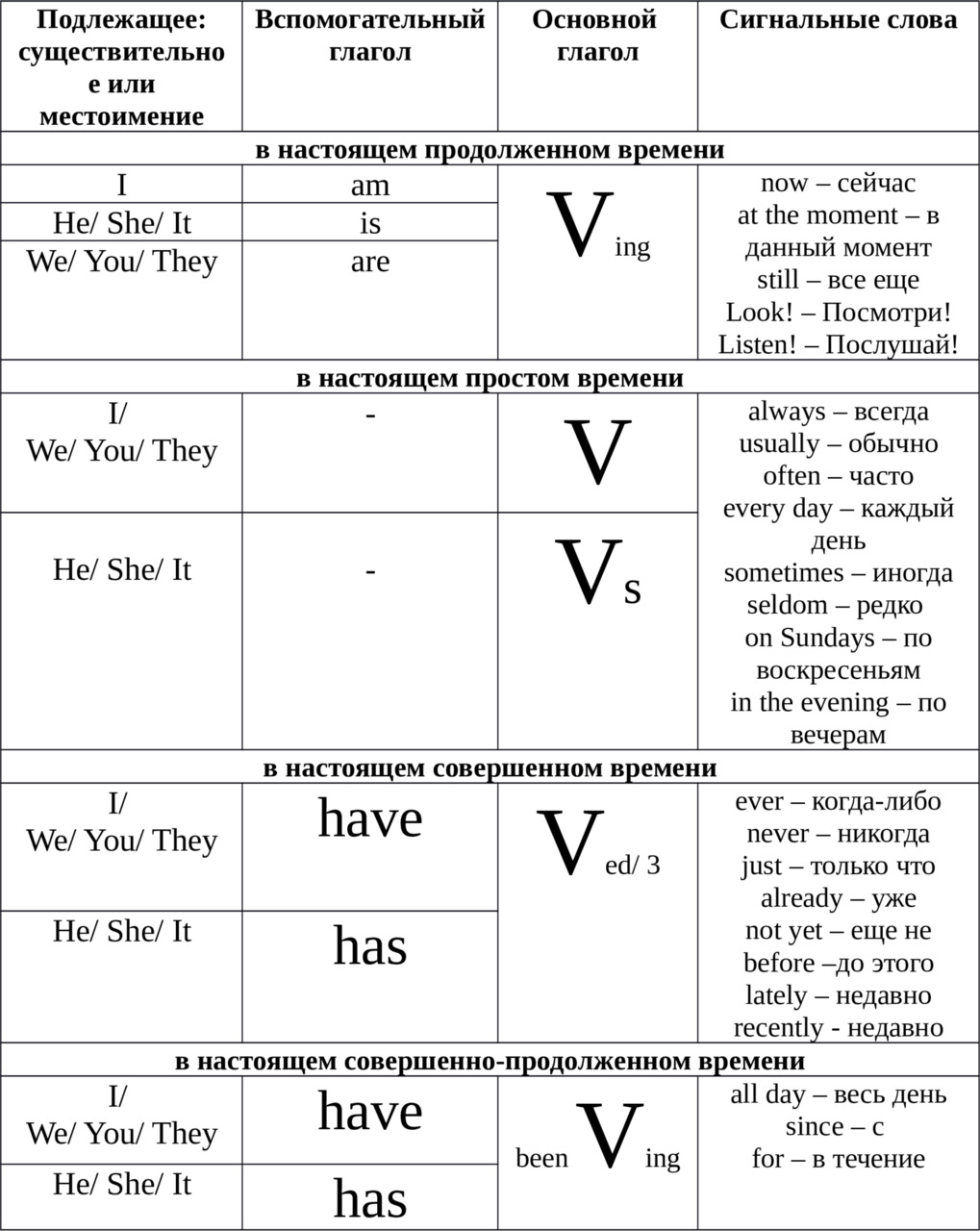
Настоящее продолженное время употребляется, когда речь идет о событиях, которые происходят в данный момент (сейчас).
Слова-маркеры настоящего продолженного времени:
now — сейчас
at the moment — в данный момент
still — все еще
Look! — Посмотри!
Listen! — Послушай!
Правило образования:
За подлежащим, выраженным местоимением или существительным, идет вспомогательный глагол to be и основной глагол с окончанием -ing.
I + am + Ving
He / She / It + is + Ving
We / You / They + are + Ving
Например:
I am dancing now. — Я танцую сейчас.
He is dancing now. — Он танцует сейчас.
They are dancing now. — Они танцуют сейчас.
Есть некоторые правила:
— У глаголов, заканчивающихся на — e, уходит конечная гласная:
come — coming (приходить),
make — making (делать),
write — writing (писать).
— У глаголов, заканчивающихся на — ie, гласные — ie заменяются на — y:
lie –lying (лежать),
tie — tying (завязывать),
die — dying (умирать).
— Если короткий глагол заканчивается на гласную с согласной, тогда эта согласная удваивается:
swim — swimming (плавать),
stop — stopping (останавливаться),
get — getting (получать).
Примечание:
Глаголы, выражающие чувства восприятия и умственную деятельность в данном времени не употребляются.
to want — хотеть,
to like — нравиться,
to love — любить,
to wish — желать,
to see — видеть,
to hear — слышать,
to feel — чувствовать,
to notice — замечать,
to remember — помнить,
to recognize — узнавать,
to forget — забывать,
to seem — казаться,
to be — быть
УПРАЖНЕНИЯ
Упражнение 1. Вставьте нужную форму вспомогательного глагола BE (am, is, are) в предложения. Переведите их на русский язык.
1. I __________reading a book.
2. We _________drinking coffee.
3. They _______ baking a cake.
4. She ________looking through the window.
5. He ________helping about the house.
6. You __________ watching TV.
7. Grandpa _________reading a newspaper.
8. The kitten _________sleeping.
Упражнение 2. Переделайте предложения так, чтобы глаголы стояли в Present Continuous.
1. I (close) the door.
2. The puppy (sleep) on the mat.
3. The bоуs (write) letters.
4. We (sing) songs.
5. Mother (make) a pie.
6. The bell (ring).
7. The man (drive) a car.
8. You and your brother (play) football.
Упражнение 3. Поставьте глаголы в скобках в Present Continuous.
1. It (rain) all day.
2. I (play) the piano now.
3. Diana (drink) tea.
4. The boy (climb) the tree.
5. The baby (drink) milk.
6. My friends (speak) English.
7. We (read) a magazine.
8. You (write) a letter to your friend.
Настоящее простое время употребляется, когда речь идет о фактах, традициях, обычаях, повторяющихся действиях в настоящем.
Слова-маркеры настоящего простого времени:
always — всегда
usually — обычно
often — часто
every day — каждый день
sometimes — иногда
seldom — редко
on Sundays — по воскресеньям
in the evening — по вечерам
Правило образования:
За подлежащим, выраженным местоимением или существительным, сразу идет основной смысловой глагол. Поэтому время называется «простым». Это время образуется простым способом: местоимение / существительное + глагол. В 3-м лице единственного числа глагол имеет окончание -s.
I / We / You / They + V (глагол)
He / She / It + Vs
Например:
I swim every day. — Я плаваю каждый день.
He swims every day. — Он плавает каждый день.
УПРАЖНЕНИЯ
Упражнение 1. Замените местоимение I на местоимение he.
Образец: I go to the office every day. — He goes to the office every day.
1. I write many letters every day.
2. I read books from the library.
3. I study grammar rules by heart
4. I usually go to work by bike.
5. I often meet my friends.
6. I work at school.
7. I come home very late.
8. I have breakfast at 7 o’clock.
Упражнение 2. Допишите окончания глаголов (-s или -es) там, где это нужно.
1. Shе go… to school by bus.
2. The kitten like… milk.
3. My brother watch… TV in the evening.
4. My dad play… tennis on Sundays.
5. My father drive… a car.
6. Masha sing… very well.
7. He wash… her face and hands in the morning and in the evening.
8. Jack do… his English exercises after school.
Упражнение 3. Поставьте глаголы, данные в скобках, в нужном времени.
1. My sister (talk) to her teacher now.
2. Не (work) every day.
3. Larisa (speak) English very well.
4. My friend (enjoy) cheeseburgers.
5. They (write) letters at this moment.
6. The children (sleep) for two hours every afternoon.
7. Miss White (talk) to Mr Johnson right now.
8. My mother (cook) dinner in the kitchen now.
Упражнение 4. Выберите правильный ответ.
1. We usually… a bus early in the morning to get to work.
a) takes b) take c) are taking d) is taking
2. They… coffee now.
a) drinking b) are drinking c) are drinks d) drink
3. My sister often… our parents.
a) visits b) visit c) is visiting d) am visiting
4.Where is Nina? — She is in the kitchen. She …pizza.
a) makes b) make c) are making d) is making
Настоящее совершенное время употребляется, когда речь идет о событии, которое уже завершилось к настоящему времени. День еще не закончился (настоящее время), а действие уже завершилось, т. е. глагол стоит в прошедшем времени в русском предложении.
Слова-маркеры настоящего совершенного времени.
ever — когда-либо
never — никогда
just — только что
already — уже
not yet — еще не
before — до этого
lately — недавно
recently — недавно
Правило образования:
За подлежащим, выраженным местоимением или существительным, идет вспомогательный глагол to have и основной глагол с окончанием -ed (если глагол правильный) или глагол в 3-ей форме из таблицы неправильных глаголов (если глагол неправильный).
I / We / You / They + have + Ved/V3
He / She / It + has + Ved/V3
Например:
I have just done my homework. — Я только что сделал домашнюю работу.
He has already cleaned his room. — Он уже убрал свою комнату.
УПРАЖНЕНИЯ
Упражнение 1. Поставьте глаголы в скобках в Present Perfect.
1. «Zenit» _____ (score) ten points in the match.
2. She _____ (run) three kilometres this morning!
3. He _____ (buy) a beautiful suit!
4. Oh, no! I _____ (lose) my money!
5. My mum _____ (write) shopping list. It’s on the kitchen table.
6. Oh no! Sue _____ (drop) the plate!
7. The garden is very green. It _____ (rain) a lot this month.
8. We _____ (know) him since 1991.
Упражнение 2. Образовать предложения, используя Present Perfect.
1. We _____the dishes. (already, wash);
2. I _____their teeth. (just, clean);
3.They ____this film. (recently, see);
4. Marat ___ his coffee. (already, drink);
5.My classmate _____ the text about Kazan. (translate);
6. My Granny ________ the apple pie. (just, bake);
7. You _______ a letter to Santa Claus. (already, write);
8. The kitten _______ milk. (just, drink)
Упражнение 3. Составить предложения.
1. Has, he, his keys, found, recently;
2. We, written, letters, have, to our friends;
3. Read the book, have, I, already;
4. Has, his mother, cooked, a very tasty dinner, just;
5. The puppy, with a ball, played, has;
6. Translated, they, have, the English text, already;
7. Started, has, the film, already;
8. Has, Kate, a lot, recently, travelled
Настоящее совершенно-продолженное время употребляется, когда речь идет о событии, которое началось с определенного момента в прошлом и продолжает длиться до сих пор.
Слова-маркеры настоящего совершенно-продолженного времени:
lately — недавно
recently — недавно
all day — весь день
since — с
for — в течение
Правило образования:
За подлежащим, выраженным местоимением или существительным, идет вспомогательный глагол to have been и основной глагол с окончанием -ing.
С одной стороны совершенность выражается с помощью have been, с другой стороны продолженность выражается с помощью been +Ving
I / We / You / They + have been + Ving
He / She / It + has been + Ving
Например:
I have been doing my homework since morning. — Я делаю домашнюю работу с утра.
He has been cleaning his room for 15 minutes. — Он убирает свою комнату 15 минут.
УПРАЖНЕНИЯ
Упражнение 1. Поставьте глаголы из скобок в форму Present Perfect Continuous.
1. The vegetables … (boil) since 10 o’clock. (Овощи варятся с 10 часов.)
2. Helen … (wait) for her answer for six months. (Елена ждет ее ответа в течение 6 месяцев.)
3. I … (try) to find my documents since last Sunday. (Я пытаюсь найти свои документы с прошлого воскресенья.)
4. They … (learn) French for a couple of years. (Они изучают французский язык пару лет.)
5. My brother … (play) computer games for 3 hours. (Мой брат играет на компьютере в течение 3 часов.)
6. I … (listen) to you for 5 minutes. (Я слушаю тебя 5 минут.)
7. He … (take) his medicine for the last week. (Он принимает лекарство в течение последней недели.)
8. We … (save) the money for a holiday for a year. (Мы копим деньги на отпуск в течение года.)
Упражнение 2. Поставьте в предложения for или since.
1. Ben has been playing hockey… he was a small boy.
2. She’s been driving that car… five years.
3. We have been planning our vacation… last month.
4. He has been talking on the phone … 8 o’clock.
5. You have been telling the same anecdotes… many years.
6. I have been feeling ill… a couple of days.
7. I have been reading… morning.
8. They have been building the school … 4 months.
Упражнение 3. Choose the right tense form.
1. Marina has been learning/has learned English for 2 years.
2. The birds have already flown/have been flying to the South.
3. They have known /have been knowing him for many years.
4. Mike has forgotten/has been forgetting to learn the poem.
5. The children have been watching/have watched cartoons for 2 hours.
6. The train has just come/has been coming.
7. We have been having/ have had a holiday for 5 years.
8. Islam has been painting/has painted in his study since 8 o’clock.
Упражнение 4. Make sentences using Present Perfect or Present Perfect Continuous.
1. Granny/knit/in the living room/ since morning.
2. Helen/travel/round Europe/for 3 weeks.
3. She/visit/already/3 countries.
4. He /do/ his lessons/since lunch.
5. I/drive/ since I was 17.
6. I/make/ a lot of mistakes.
7. She /worry/ about this/ for two months.
8. They /study/the English language/ for hours every day.
ДОМАШНЕЕ ЗАДАНИЕ
Задание на грамматику 1
Преобразуйте слова так, чтобы они грамматически соответствовали содержанию предложений.
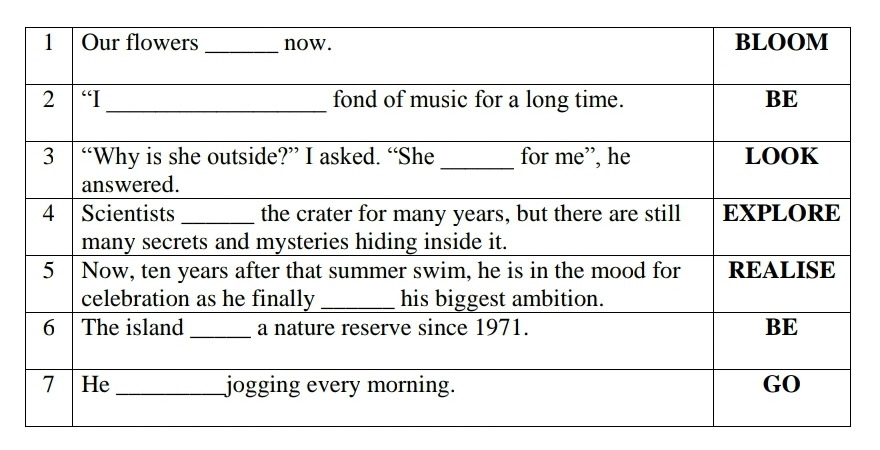
Задание на грамматику 2
Преобразуйте слова так, чтобы они грамматически соответствовали содержанию предложений.
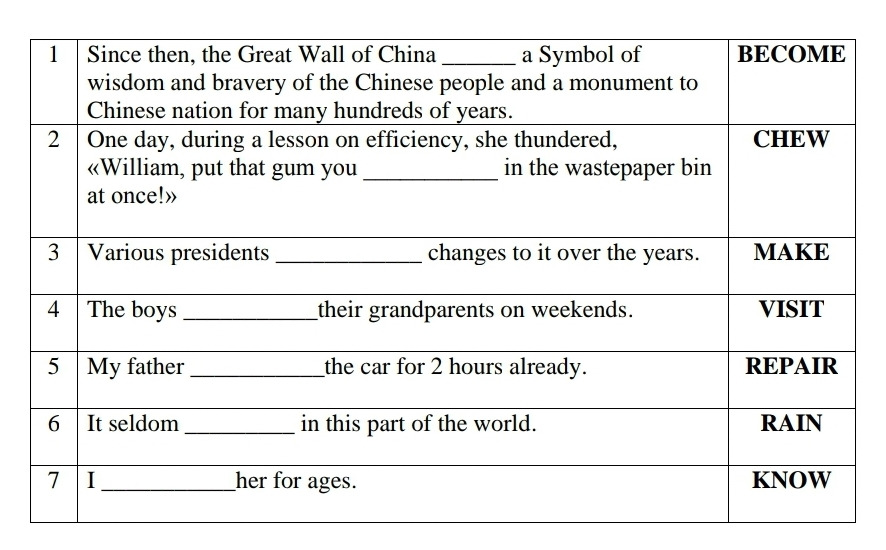
Занятия №№9—10. Работа с текстом «My Working Day»
ЛЕКСИКА:
get up — вставать
make one’s bed — заправлять кровать
do morning exercises — делать зарядку
a cup of tea — чашка чая
bread — хлеб
butter — масло
porridge — каша
copy-book — тетрадь
lesson — урок
watch TV — смотреть телевизор
ЧТЕНИЕ
I get up at 7 o’clock in the morning. Then I make my bed and do my morning exercises. I go to the bathroom and wash my face and clean my teeth. At 7.30 I go the kitchen and have a cup of tea, bread, butter and some porridge. I put my books, pens, copy-books and other things into my bag. Then I go to school. Usually I have 5 lessons at school. I come home at 2 o’clock and have dinner. At 4 o’clock I do my homework. I always read books and play video-games in the evenings. I go to bed at 10 o’clock.
ЗАДАНИЕ
Отметьте верны или неверны утверждения:
— She gets up at 7 o’clock.
True False
— She does morning exercises.
True False
— She has 4 lessons at school.
True False
— She comes home at 2 o’clock.
True False
— She does her homework at 5 o’clock.
True False
— She goes to bed at 10 o’clock.
True False
ДОМАШНЕЕ ЗАДАНИЕ
ОБРАЗЕЦ УСТНОЙ РЕЧИ УЧАЩИХСЯ (МОНОЛОГА)
MY WORKING DAY
1. I want to tell you about my working day.
2. I get up at 7 o’clock in the morning.
3. Then I make my bed do my morning exercises.
4. I go to the bathroom and wash my face and clean my teeth.
5. At 7.30 I go the kitchen and have a cup of tea, bread, butter and some porridge.
6. I put my books, pens, copy-books and other things into my bag.
7. Then I go to school.
8. Usually I have 5 lessons at school.
9. I come home at 2 o’clock and have dinner.
10. At 4 o’clock I do my homework.
11. I always read books and play video-games in the evenings.
12. I go to bed at 10 o’clock.
13. That’s all I want to tell you about my working day.
Занятия №№11—13. Настоящие времена: Present Simple/ Present Continuous/ Present Perfect/ Present Perfect-Continuous (отрицательные предложения)
Образование отрицательных предложений
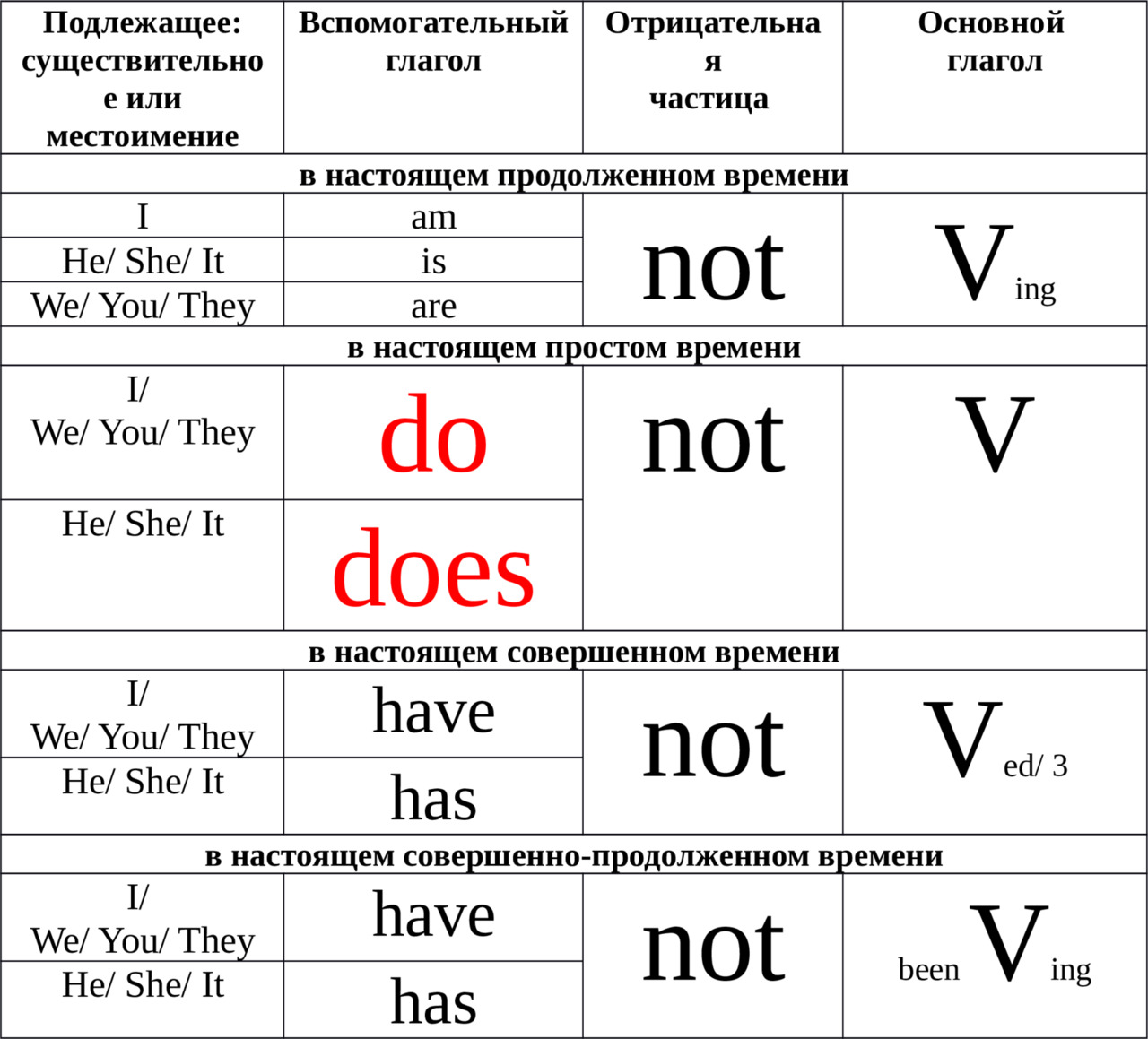
УПРАЖНЕНИЯ
Упражнение 1. Сделайте все глаголы в скобках в предложениях про настоящее длительное время отрицательными.
1. I (have) a shower.
2. The sun (shine).
3. They (play) football.
4. She (read) a newspaper.
5. My brother (swim) in the sea.
6. We (draw) pictures.
7. Jess and Jane (watch) cartoons.
8. Mike (ride) a bike.
Упражнение 2. Составьте отрицание к предложению.
1. I am skiing now.
2. Den speaks English.
3. His sister has been reading the book since morning.
4. Nick has phoned his teacher.
5. Misha read a magazine yesterday.
6. They will study at the University next year..
7. Shops open at 9 o’clock.
8. I have learnt the poem by heart.
Упражнение 3. Заполните пропуски, используя don’t, doesn’t, isn’t, aren’t или am not.
1. We… watching a television programme now.
2. We… watch television every day.
3. It… raining cats and dogs.
4. I… listening to music.
5. It… rain in autumn.
6. My dad… eating his lunch now.
7. Milena… always eat at that cafe.
8. He… have money for a new car.
Упражнение 4. Составьте отрицание к предложению.
— Kristina speaks English very well.
— I like my phone.
— Masha reads magazines every week.
— They are students.
— Shops open at 9 o’clock.
— She is pretty.
— Tom lies every time.
— Marina wears skirts every day.
Упражнение 5. Поставьте глагол в скобках в Present Perfect или Present Perfect Continuous.
— I (not to see) him for ages.
— He (to do) his lessons since lunch.
— I (not to hear) about him for a long time.
— I (to drive) since I was 17.
— Jack (to fail) his driving test three times because he doesn’t know how to park.
— I think he (make) a lot of improvement.
— Alice (not/pass) her driving test because she doesn’t know the rules well.
— She (study) the driver’s manual for hours every day.
ДОМАШНЕЕ ЗАДАНИЕ
Задание на грамматику 1
Преобразуйте слова так, чтобы они грамматически соответствовали содержанию предложений.
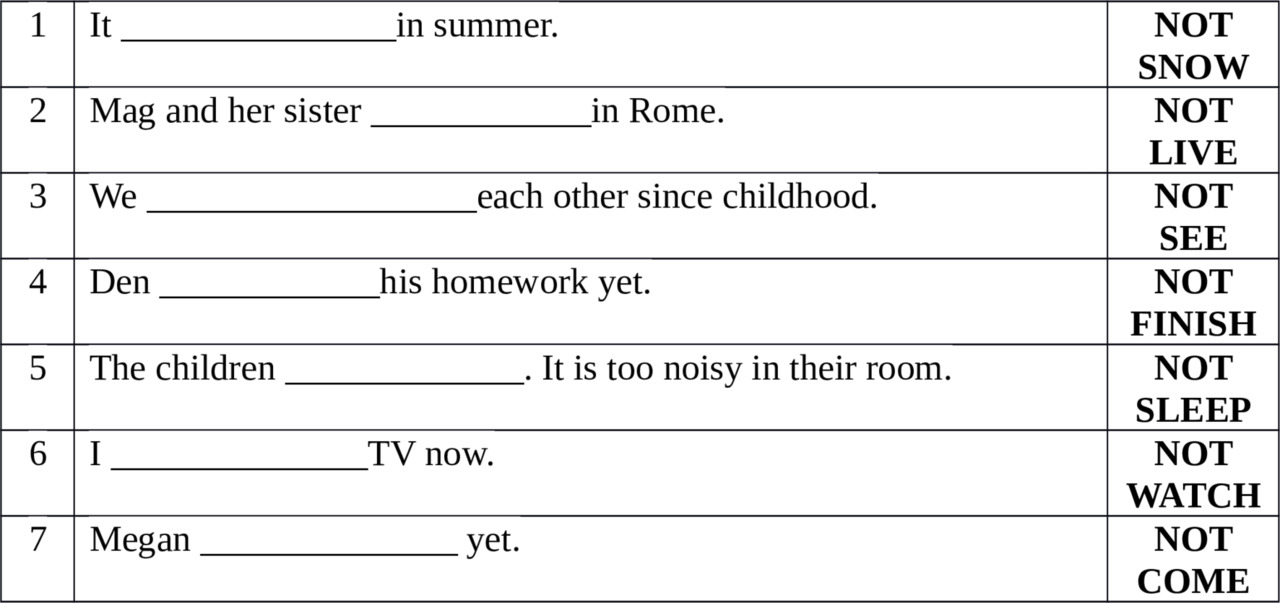
Задание на грамматику 2
Преобразуйте слова так, чтобы они грамматически соответствовали содержанию предложений.
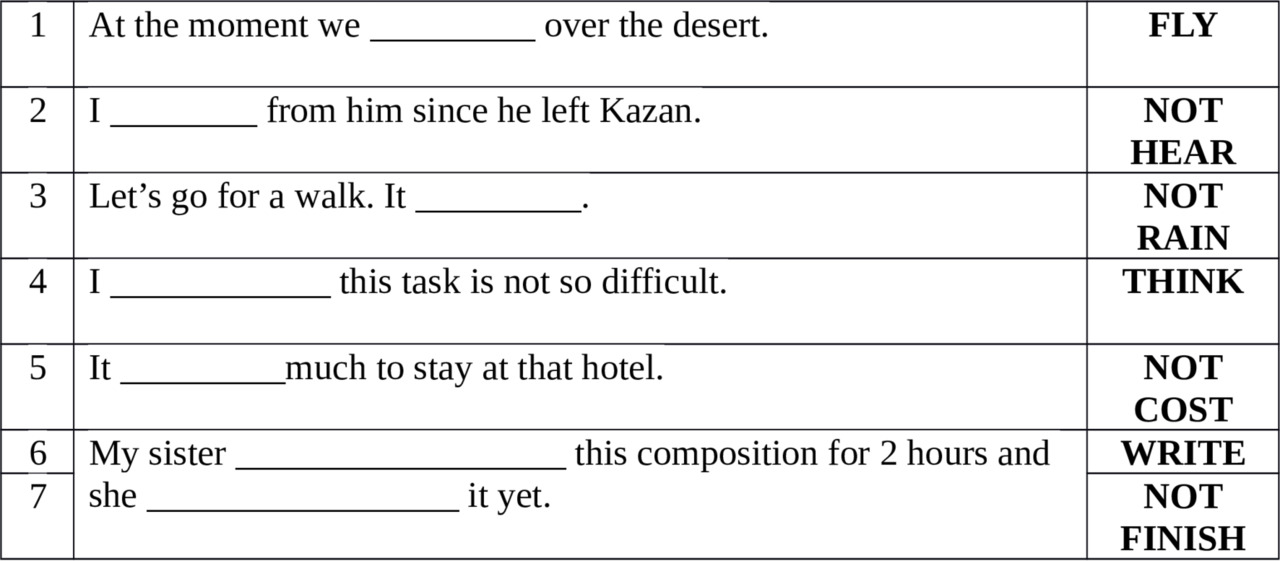
Занятия №№14—15. Работа с картинками
ЛЕКСИКА:
I’d like to describe picture number … — Я бы хотел (а) описать картинку номер…
The picture shows … — Картинка показывает…..
The action is taking place … — Действие происходит
The photo was taken inside/outside — Фото было снято внутри или снаружи
pleasant — приятно
landscape — пейзаж
vivid — яркий
reminds me of — напоминает мне о
childhood — детство
full — полный
around — вокруг
back — обратно
План описания картинки
1. I’d like to describe a picture number…
2. The picture shows us …a nice/ hot/cold/warm /rainy summer/winter/spring/autumn day.
3. The photo was taken outside/inside.
4. The action is taking place at school/at home/ in the supermarket/in the park/in the gym/in the café/in the city center/in the countryside.
5. In the picture I can see… a boy/a girl/a woman/a man/a child/boys/girls/ city/monument/ house/Big Ben/ bridge/nature/landscape
6. The boy/the girl/the woman/the man/the child/boys/girls/ city/monument/ house/Big Ben/ bridge/nature/landscape looks/look nice/great.
7. He/ She has got dark/ fair hair. He/ She has got brown/blue/green eyes.
(The building is old/modern and high/low. It is very pleasant to look at.
The landscape is beautiful. Everything is green/white with snow and peaceful. The picture is very vivid.)
8. He/ She is wearing a dress, a T-shirt/a shirt/jeans/a skirt/ a jacket/trousers…
9. The boy/the girl is reading a book/playing a computer game/ watching TV/cooking/ playing tennis/playing hockey/ watching video/ flying on a plane/playing football/ relaxing.
10. In the background there are trees/…
11. I like the picture, because it’s full of positive emotions and reminds me of school/summer/holidays/ my trip to London/ my granny/ my friends/ my childhood.
12. Besides I like to read/… too.
ЗАДАНИЕ: Прочитайте текст и вставьте вместо каждого пропуска подходящее слово, выбрав его из выпадающего списка. Два слова в списке лишние.
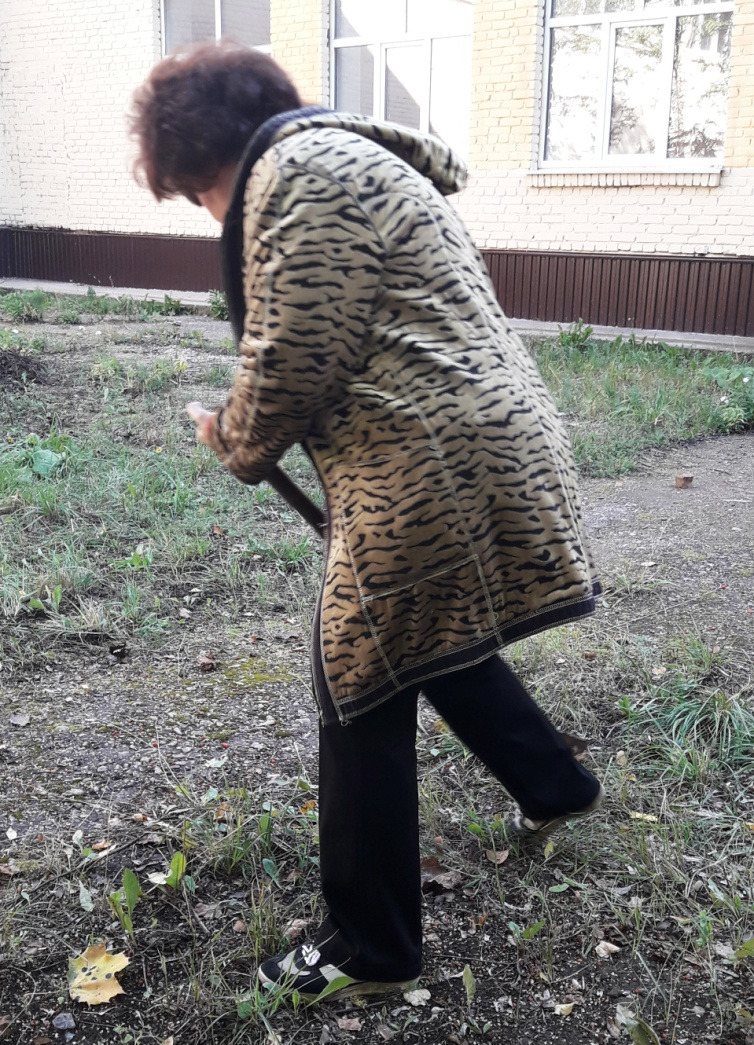
1. I’d like to describe a picture number…
2. The picture shows us a very nice autumn day.
3. The photo was taken outside.
4. The action is taking place in the A ______yard.
5. In the picture I can see a woman.
6. The woman looks nice.
7. She has got short B _______hair.
8. She is wearing a coat, C _____trousers and white and black trainers.
9. The woman is cleaning the D ________.
10. I guess she is concentrated.
11. In the background there is a building.
12. I like the picture, because it’s E ______of positive emotions.
1. full; 2. path; 3. around; 4. school 5. back; 6. dark; 7. black.
ДОМАШНЕЕ ЗАДАНИЕ
Выберите фотографию и опишите ее. У вас есть полторы минуты на подготовку и не более двух минут для ответа. У вас должен получиться связный рассказ (10—12 предложений).
План ответа поможет вам:
— the place
— the action
— the appearance of the person
— whether you like the picture or not
— why
Start with: «I’d like to describe picture. The picture shows…»
Занятия №№16—18. Настоящие времена: Present Simple/ Present Continuous/ Present Perfect/ Present Perfect-Continuous (вопросительные предложения).
Образование вопросительных предложений
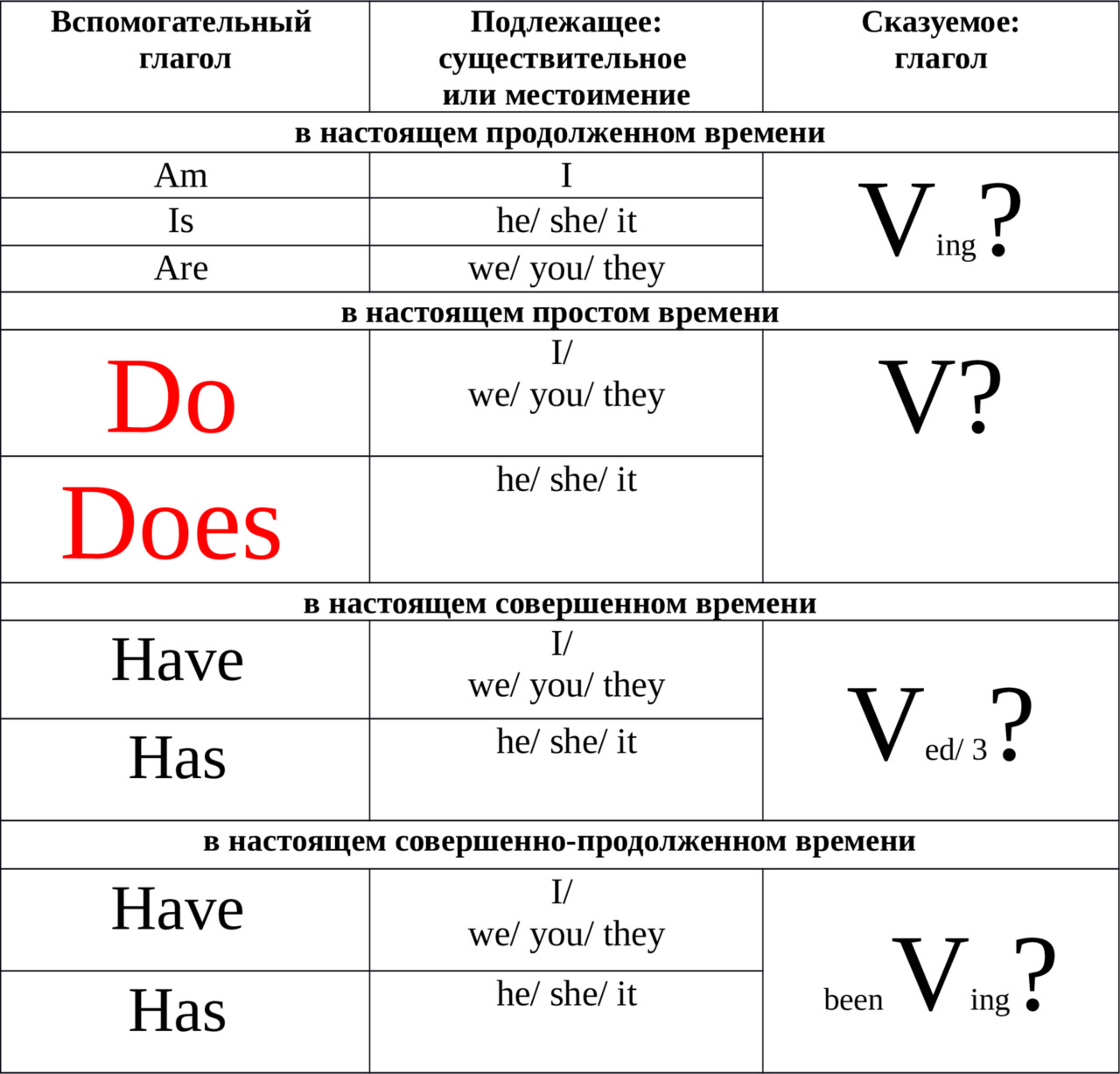
УПРАЖНЕНИЯ
Упражнение 1. Поставьте глаголы в скобках в Present Simple или Present Continuous.
1. — What ____you ________ (do)? — I _______ (wait) for my teacher.
2. — ______he _______ (speak) English? — No, he _________ (speak) English.
3. ____ Ann ____ any friends? (to have)
4. ____ they ____ the flowers every 3 days? (to water)
5. ____ Irina_____ milk? (to drink)
6. ____his brother _____ in an office? (to work)
7. ____your mother ____ fish? (to like)
8. ____ you____ Russian? (to speak)
Упражнение 2. Make the questions as in example: (you / ever / be / to Italy) — Have you ever been to Italy?
1. You ever / be / to the USA?
2. You / read / any French books?
3. You / live / in this town all your life?
4. You ever / write / a poem?
5. What’s / the most beautiful city / you /ever / visit?
6. You ever / speak / to a famous person?
7. You ever / live / abroad?
8. You ever / speak / to a foreigner?
Упражнение 3. Put the verbs in brackets in the Past Simple or in the Present Perfect.
1. You (ever work) ______ in a shop?
2. How many symphonies Beethoven (compose) ______?
3. Where _____you _____ (be)?
4. Where _____you _____ (go) last week?
5. _____ they ______ (write) a dictation yesterday?
6. _____ the English teacher _____ (check) our tests yet?
7. You (have) ______ a holiday this year yet?
8. You (see) ______ any good films recently?
Упражнение 4. Fill in the words to form questions.
did, are, do, have, will, was, is, has
1. ______ you like to read?
2. _____ she reading an adventure story?
3. ______ you seen «Harry Potter»?
4. ______ your dad at home yeterday?
5. _____ you going to school now?
6. _____ you go to the cinema last night?
7. _____ he finished his training yet?
8. _____ we go to the forest tomorrow?
Упражнение 5. Ответьте на вопросы.
1. Have you ever read English books in original?
2. Have you ever been abroad?
3. Has your sister ever been to London?
4. Have you ever played any musical instruments?
5. Has your brother learnt a poem yet?
6. Has your sister come from school?
7. Have you ever played handball?
8. Has your grandmother baked a pie?
ДОМАШНЕЕ ЗАДАНИЕ
Задание на грамматику 1
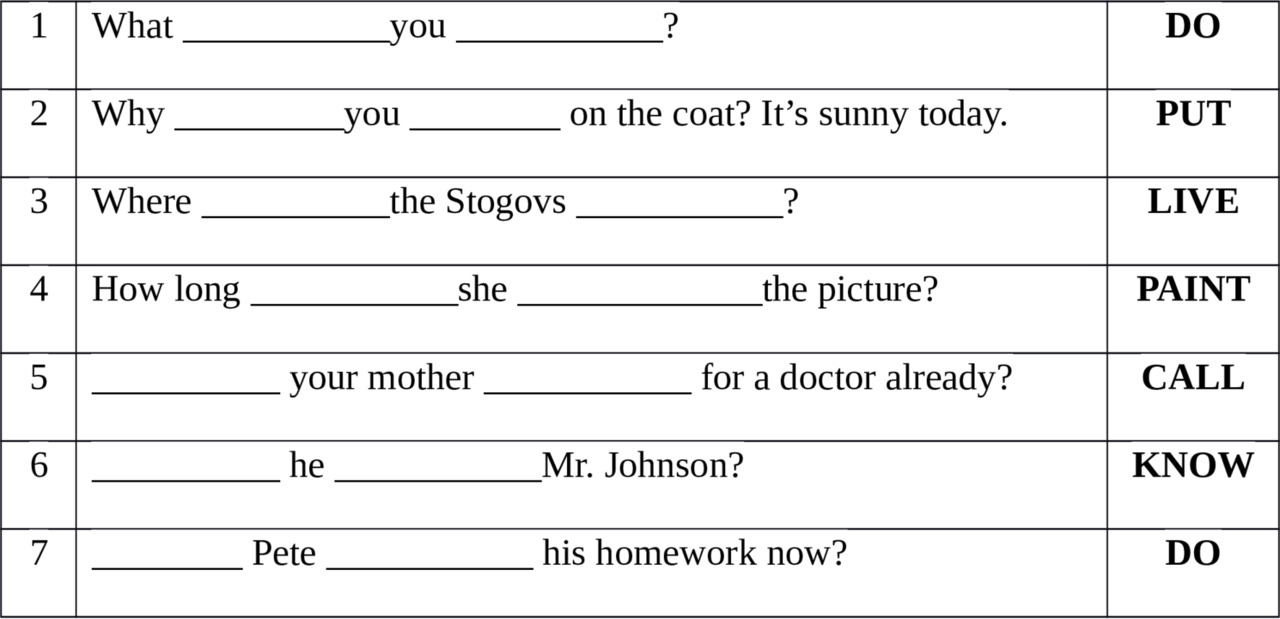
Задание на грамматику 2
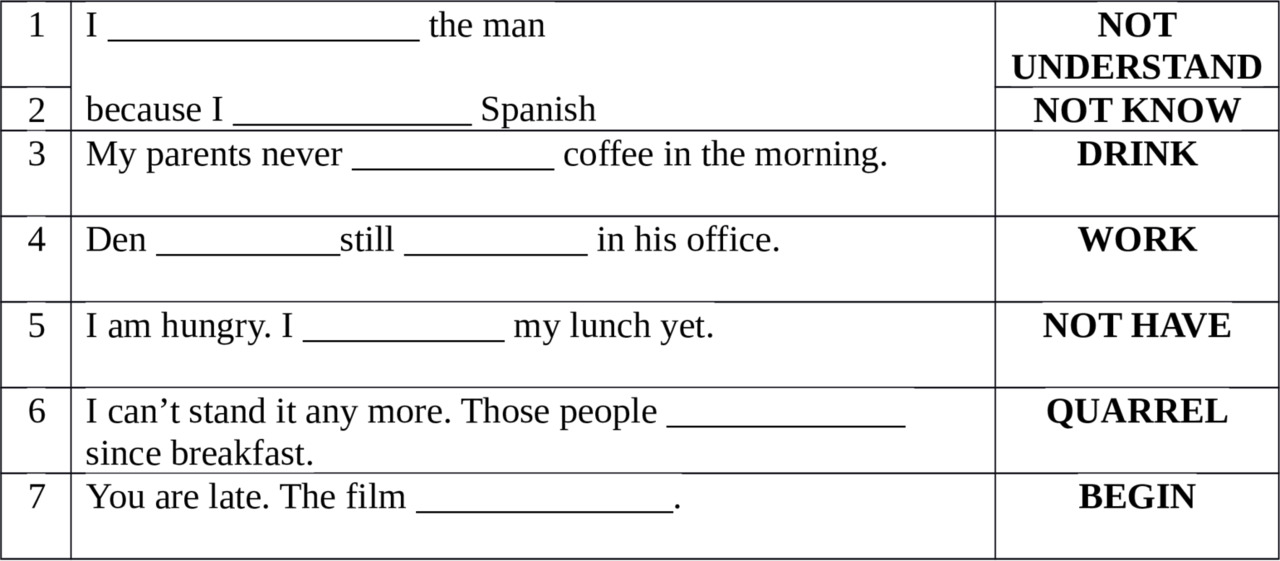
Занятия №№19—20. Работа с текстом «My School Life»
ЛЕКСИКА:
school life — школьная жизнь
light — светлый
beautiful –красивый
together — вместе
celebrate — праздновать
classmate — одноклассник
receive — получать
mark — оценка
ОБРАЗЕЦ УСТНОЙ РЕЧИ УЧАЩИХСЯ (МОНОЛОГА)
MY SCHOOL LIFE
1. I’d like to tell you about my school life.
2. I’m a student of the 5th form.
3. I study at school №6.
4. My school is small but light and beautiful.
5. I go to school 5/ 6 days a week.
6. We have 5/ 6 lessons a day.
7. My favourite subjects are Maths and English (Russian, Art, etc.)
8. I usually receive good marks in these subjects.
9. I like to go to school because here I have many friends.
10. Sometimes we have a good time together celebrating some holidays or somebody’s birthday.
11. I love my school, my classmates and teachers.
12. That’s all I want to tell you about my school life.
ЗАДАНИЕ
Ответьте на вопросы:
1. Where do you study?
2. How many lessons do you have at school?
3. What are your favourite subjects?
4. Why do you like to go to school?
5. What do you do together at school?
Занятия №№21—23. Будущие времена: Future Simple/ Future Continuous/ Future Perfect/ Future Perfect-Continuous (утвердительные предложения)
Образование утвердительных предложений
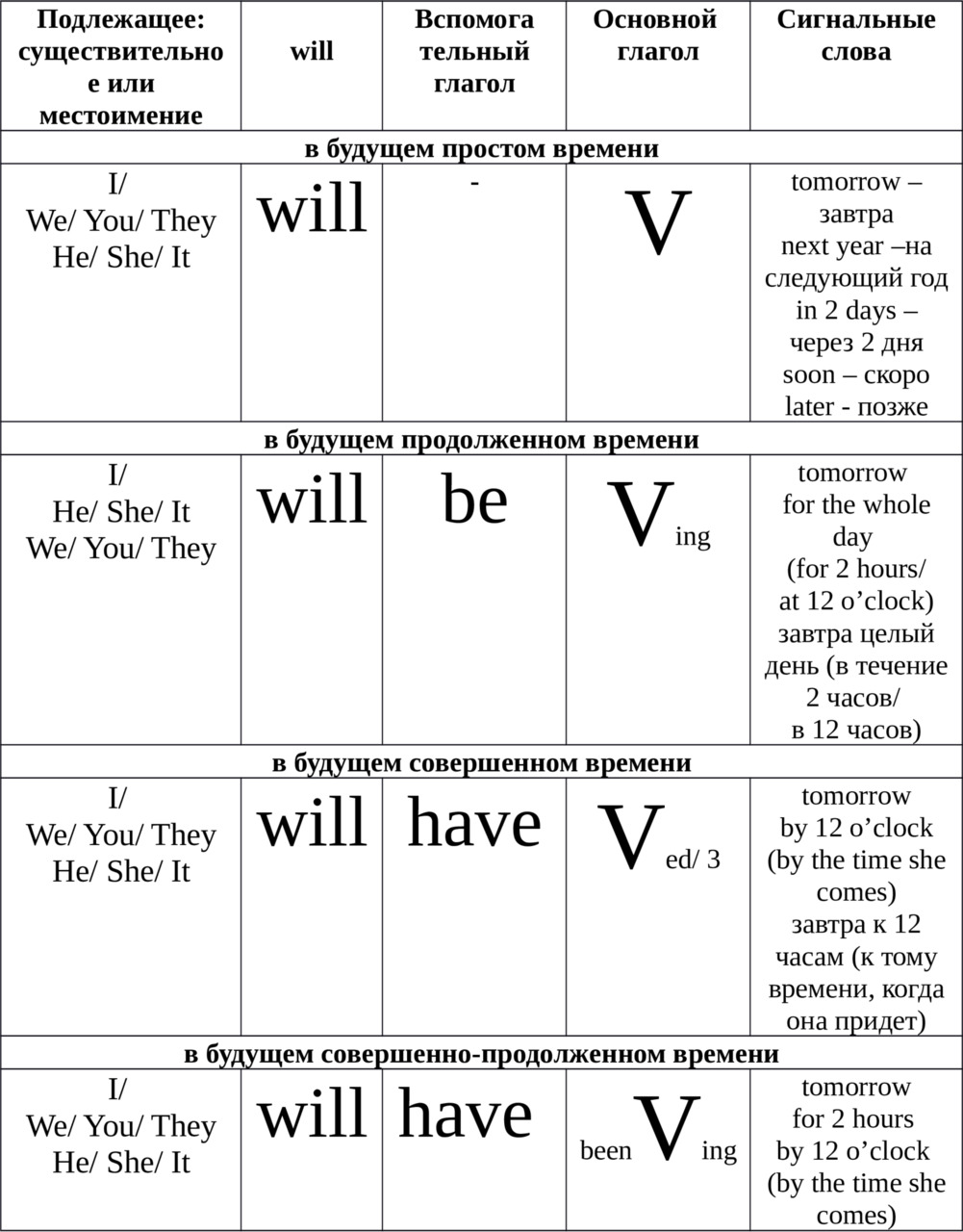
Будущее простое время употребляется, когда говорим о действиях, которые произойдут в будущем.
Слова-маркеры будущего простого времени:
tomorrow — завтра
next year — на следующий год
in 2 days — через 2 дня
soon — скоро
later — позже
Правило образования:
За подлежащим, выраженным местоимением или существительным, идет вспомогательный глагол will и основной глагол без окончания.
I / He / She / It / We / You / They + will + V (глагол)
Например:
I will swim tomorrow. — Я буду плавать завтра.
He will swim in 2 days. — Он будет плавать через 2 дня.
УПРАЖНЕНИЯ
Упражнение 1. Напишите следующие предложения во времени Future Simple.
1. I (ride) a bike tomorrow.
2. Mary (fly) to Spain in 2 hours.
3. They (go) to England next month.
4. You (visit) Mary tomorrow.
5. We (visit) our grandparents tomorrow.
6. They (dance) at the party next Sunday.
7. Ben (invite) you to his party next week.
8. The kitten (sleep) after lunch.
Упражнение 2. Напишите, что произойдет: They usually go to the park. They will go to the park tomorrow.
1. I usually play football.
2. We usually get up at 7 o’clock.
3 He usually visits his grandmother on Sunday.
4. My mother usually bakes a cake on Saturdays.
5. Nick reads a book in the evening.
6. The boys usually play basketball during PE lesson.
7. My sister often drinks coffee in the morning.
8. The dog always waits for me after school.
Будущее продолженное время употребляется для выражения определенного процесса в определенный момент будущего.
Слова-маркеры будущего продолженного времени:
tomorrow at 5 o’clock — завтра в 5 часов
tomorrow when my mother comes — завтра, когда придет мама
Правило образования:
За подлежащим, выраженным местоимением или существительным, идет вспомогательный глагол will be и основной глагол с окончанием -ing.
I / He / She / It / We / You / They + will be + Ving
Например:
I will be dancing tomorrow at 5 o’clock. — Я буду танцевать завтра в 5 часов.
He will be dancing tomorrow at 5 o’clock. — Он будет танцевать завтра в 5 часов.
They will be dancing tomorrow at 5 o’clock. — Они будут танцевать завтра в 5 часов.
УПРАЖНЕНИЕ
Answer the questions in Future Continuous.
— What will Zana be doing? (make a skirt)
— What will Michael be doing? (swim in the Red Sea)
— What will Paul’s grandfather be doing? (work in the orchard)
— What will Greg be doing at the University? (study languages)
— What will Megan’s mother be doing? (fly to Mumbai)
— What will the singer be doing at the concert? (sing songs)
ДОМАШНЕЕ ЗАДАНИЕ
Задания на грамматику 1
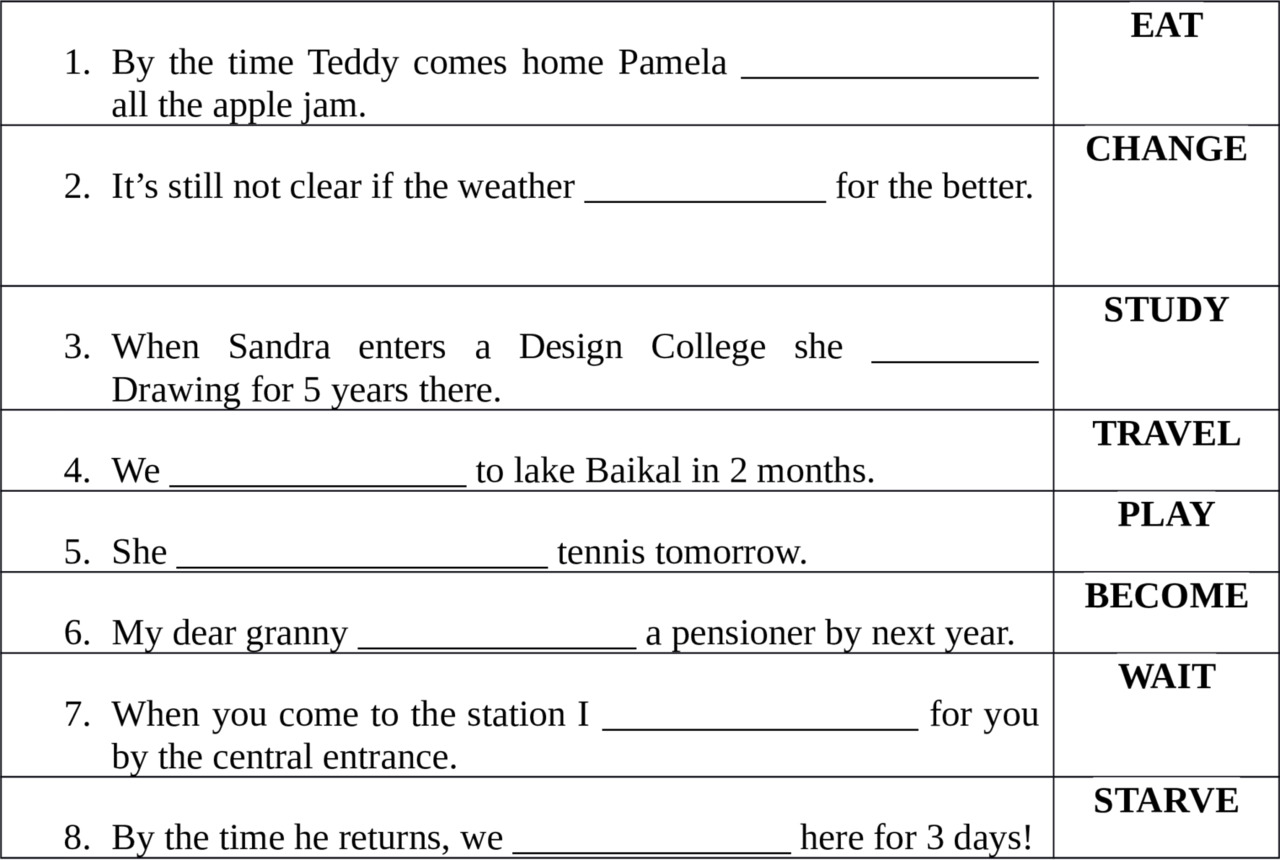
Задания на грамматику 2
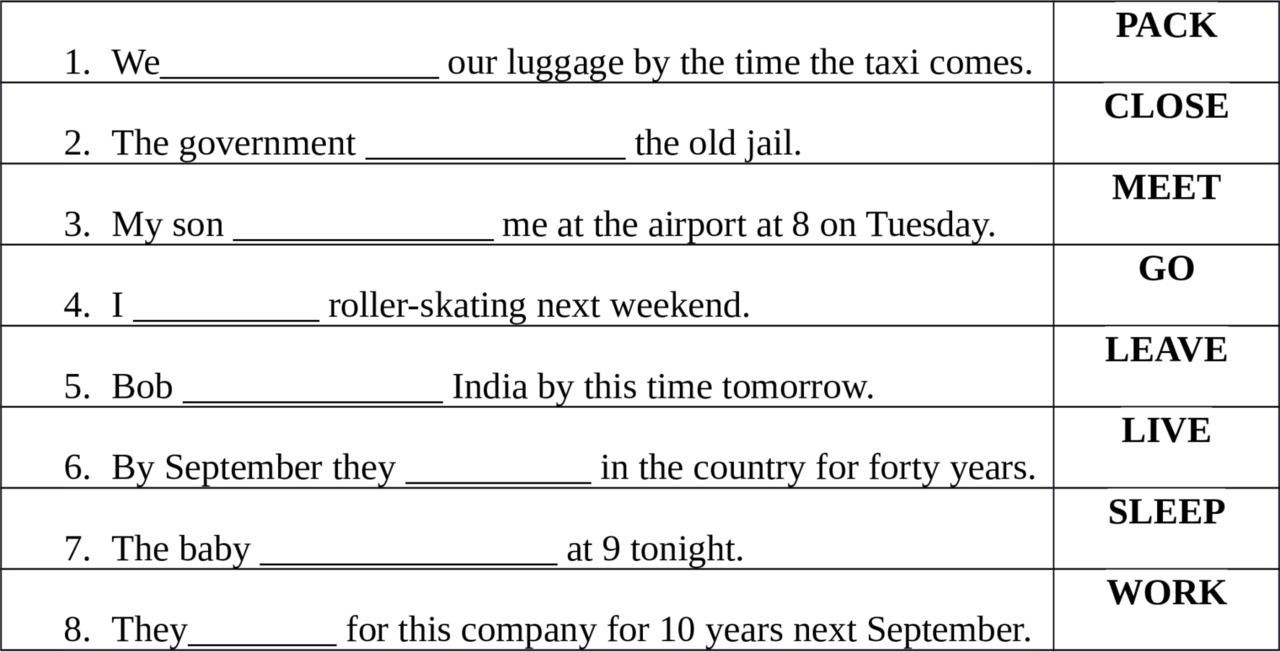
Занятия №№24—25. Работа с текстом «Travelling»
ЛЕКСИКА:
to be fond — обожать, любить
for pleasure — для удовольствия
various means — различные виды, средства
air — воздух
dust — пыль
dirt — грязь
a railway — железная дорога
journey — путешествие
trouble — проблема
speed- скорость
combined — скомбинированный
carriage — вагон
a splendid view — великолепный вид
the countryside — сельская местность
to be hungry — быть голодным
the dining-car — вагон-ресторан
a sleeper — спальный вагон
pleasant — приятный
a wave — волна
fresh — свежий
a seagull — чайка
sights — достопримечательности
a ticket — билет
a suitcase — багаж, чемодан
hiking — пеший туризм
hitch-hiking — автостоп
abroad — за границей
convenient — удобный
pleasure — удовольствие
on foot — пешком
all over the world — во всем мире
to spend — проводить
holidays — отпуск, каникулы
other — другие
countries and continents — страны и континенты
to discover — исследовать
of course — конечно
a lot of fun — много развлечений
1. Прочитайте текст и вставьте вместо каждого пропуска подходящее слово, выбрав его из выпадающего списка. Два слова в списке лишние.
A) All people are fond of travelling. It is very interesting to see new places, another towns and countries. People may travel either for pleasure or on business. There are various means of travelling. For me there is nothing like travel by air; it is more comfortable, A _______and, of course, far quicker than any other means. There is none of the dust and dirt of a railway or car journey, none of the trouble of changing from train to steamer and then to another train.
B) With a train you have speed, comfort and B _______combined. From the comfortable seat of a railway carriage you have a splendid view of the whole countryside. If you are hungry, you can have a meal in the dining-car; and if a journey is a long one you can have a wonderful bed in a sleeper.
C) Travelling by ship is also very C ______now. It is very pleasant to feel the deck of the ship under the feet, to see the rise and fall of the waves, to feel the fresh sea wind blowing in the face and hear the cry of the seagulls.
D) Many people like to D ______by car. It is interesting too, because you can see many sights in a short time, you can stop when and where you like, you do not have to buy tickets or carry your suitcases.
E) A very popular means of travelling is hiking. It is travelling on foot. Walking tours are very interesting. Hitch-hiking is a very popular method of travelling among E _____people.
1. travel; 2. more convenient; 3. become; 4. pleasure; 5. popular; 6. polluted; 7. young.
2. Установите соответствие между текстами и их темами, выбрав тему из выпадающего списка. Используйте каждую тему только один раз. В задании одна тема лишняя.
This text deals with…
1. Travelling by ship.
2. Travelling by air.
3. Travelling on foot.
4. Travelling by train.
5. Travelling by bike.
6. Travelling by car.
ДОМАШНЕЕ ЗАДАНИЕ
ОБРАЗЕЦ УСТНОЙ РЕЧИ УЧАЩИХСЯ (МОНОЛОГА)
TRAVELLING
1. I want to tell you about travelling.
2. People all over the world spend their holidays travelling.
3. They travel to see other countries and continents.
Бесплатный фрагмент закончился.
Купите книгу, чтобы продолжить чтение.
